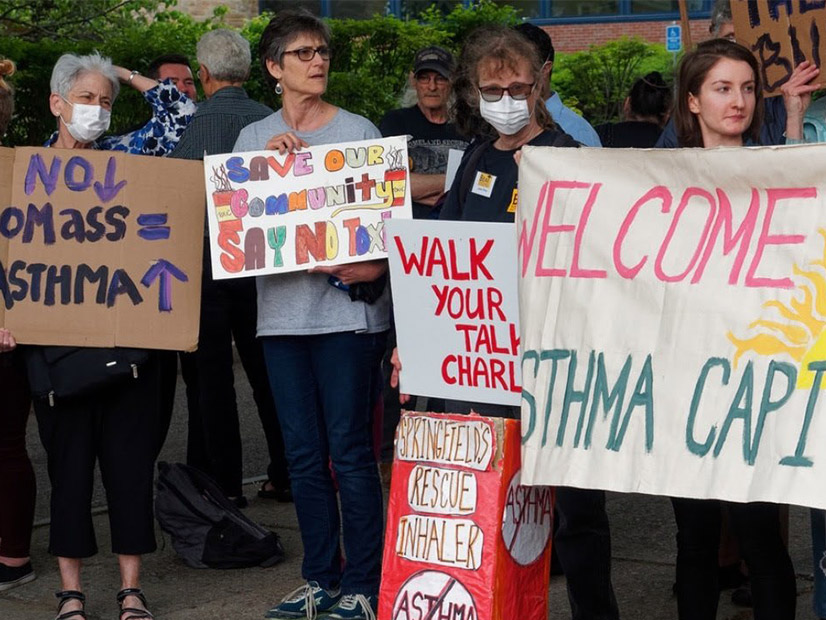Massachusetts has proposed new state regulations that make it harder for biomass power plants to qualify for renewable energy subsidies.
The announcement reverses the Massachusetts Department of Renewable Energy (DOER)’s original plan in December to allow some wood-burning biomass power plants to qualify for renewable energy subsidies. It also closely follows the state’s decision to revoke a construction permit it granted in 2012 to a wood-burning power plant in Springfield, Mass. (See Mass. DEP, Biomass Developer Tussle over Permit)
Residents and local leaders from environmental justice communities, along with public health experts, had criticized planned subsidies for biomass facilities.
“They spoke clearly, and the administration heard their concerns about the negative impact these regulations could have for environmental justice communities,” Kathleen Theoharides, state Energy and Environmental Affairs secretary, said at a press conference last week.
However, the changes to DOER’s original proposal do not entirely prevent wood-burning biomass plants from receiving state subsidies.
To qualify, biomass facilities built since the end of last year need to meet 60% operational efficiency. State officials also said they will prohibit any biomass plant that burns wood from the renewable energy subsidy program if they are located within five miles of an environmental justice population.
Wood-to-power facilities typically reach an efficiency of somewhere between 30 and 50%, Peter Thompson, deputy director of the Biomass Thermal Energy Council, told NetZero Insider.
The power plant proposed by Palmer Renewable Energy in Springfield would only meet an efficiency of 29%, meaning most of the energy it produces would be wasted as heat.
To reach the 60% efficiency standard, biomass power plants can capture the heat produced and use it for something else, such as heating a building to create a combined heat and power (CHP) facility.
Most CHP facilities have efficiencies of 70 to 90%, well above the 60% requirement. But capital investment in a CHP addition is a barrier for energy companies. Massachusetts should establish an investment program to allow CHP retrofits for biomass power plants, and use the heat to keep community buildings warm, Thompson said.
Until long-duration energy storage solutions are available, the state should not discount biomass power plants, Thompson said.
“This opens up the question of which renewable energy resource will meet the demand gap,” he said.
The new rules do not apply to existing biomass plants, but the Palmer facility in Springfield as planned would be the largest commercial biomass plant in the state, burning about 1,200 tons of wood per day and emitting soot, mercury and lead.
Even if Palmer added a CHP element to its facility, the newly proposed rules would still prevent the facility from coming to fruition. The site Palmer prepped for construction is in the heart of a state-designated environmental justice community — and the “asthma capital” of the U.S., according to the Asthma and Allergy Foundation of America.
Large Biomass Plants in Maine Qualify for Mass. RPS
Energy policy experts raised concerns that the new proposed rules for biomass are a step backward from the state’s recently passed climate law, according to Mary Booth, director of the Partnership for Policy Integrity. She said the rules remove the current requirement for plants that are already built to meet the efficiency standard.
“Theoretically, plants in Maine that are currently burning forest wood could qualify for the Massachusetts Renewable Energy Portfolio Standard once again if they claim to be burning non-forest derived residues,” Booth told NetZero Insider.
Biomass power plants in Maine used to qualify for the Massachusetts Renewable Energy Portfolio Standard like solar and wind did. In 2016, the new energy efficiency requirement made biomass no longer eligible.
“This new rollback would restore eligibility,” Booth said.
And burning wood for electricity produces more GHG emissions than fossil fuels, according to a state-commissioned study.
“There is asthma and chronic obstructive pulmonary disease in non-environmental justice communities, too,” Booth said. “Why would the state be subsidizing any polluting facility as renewable energy?”
Palmer’s Appeal
Palmer did not respond to a request for comment on the new rule, but the company is appealing the state’s decision to revoke its permit approval.
The Massachusetts Department of Environmental Protection’s Office of Appeals denied Palmer’s emergency motion to stay the revocation on Tuesday and ordered the company to suspend all construction until a final decision is made.
The hearing for the Palmer plant will take place on July 15.
DOER is seeking public comment on the rules for biomass power plants. Written comments will be accepted until May 17 at doer.rps@mass.gov.


